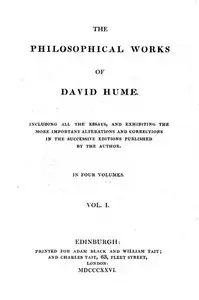"A History of England from Early Times: A Linked Index to the Project Gutenberg Editions" by David Hume, with continuations by Tobias Smollett and others, is a sweeping historical journey through England's past, starting from ancient times and stretching into the Victorian age. The book uncovers the political, social, and cultural shifts that molded England through different rulers and crucial times in history. Organized in volumes that follow a timeline, the story begins with the early British tribes, then moves through the Roman invasion, the rise of kingdoms, and the reigns of powerful kings like William the Conqueror and Henry VIII. Each chapter reveals the lives of important people and the impact of their time in power, as well as key events such as the signing of the Magna Carta and the English Civil War, revealing the transformation of England and the major events which shaped what it would become.

A History of England from Early Times: A Linked Index to the Project Gutenberg Editions
By David Hume
Explore England's past from its tribal beginnings to the Victorian era, encountering powerful monarchs, pivotal battles, and the forging of a nation's identity.
Summary
About the AuthorDavid Hume was a Scottish philosopher, historian, economist, and essayist who was best known for his highly influential system of empiricism, philosophical scepticism and metaphysical naturalism. Beginning with A Treatise of Human Nature (1739–40), Hume strove to create a naturalistic science of man that examined the psychological basis of human nature. Hume followed John Locke in rejecting the existence of innate ideas, concluding that all human knowledge derives solely from experience. This places him with Francis Bacon, Thomas Hobbes, John Locke, and George Berkeley as an empiricist.
David Hume was a Scottish philosopher, historian, economist, and essayist who was best known for his highly influential system of empiricism, philosophical scepticism and metaphysical naturalism. Beginning with A Treatise of Human Nature (1739–40), Hume strove to create a naturalistic science of man that examined the psychological basis of human nature. Hume followed John Locke in rejecting the existence of innate ideas, concluding that all human knowledge derives solely from experience. This places him with Francis Bacon, Thomas Hobbes, John Locke, and George Berkeley as an empiricist.



















